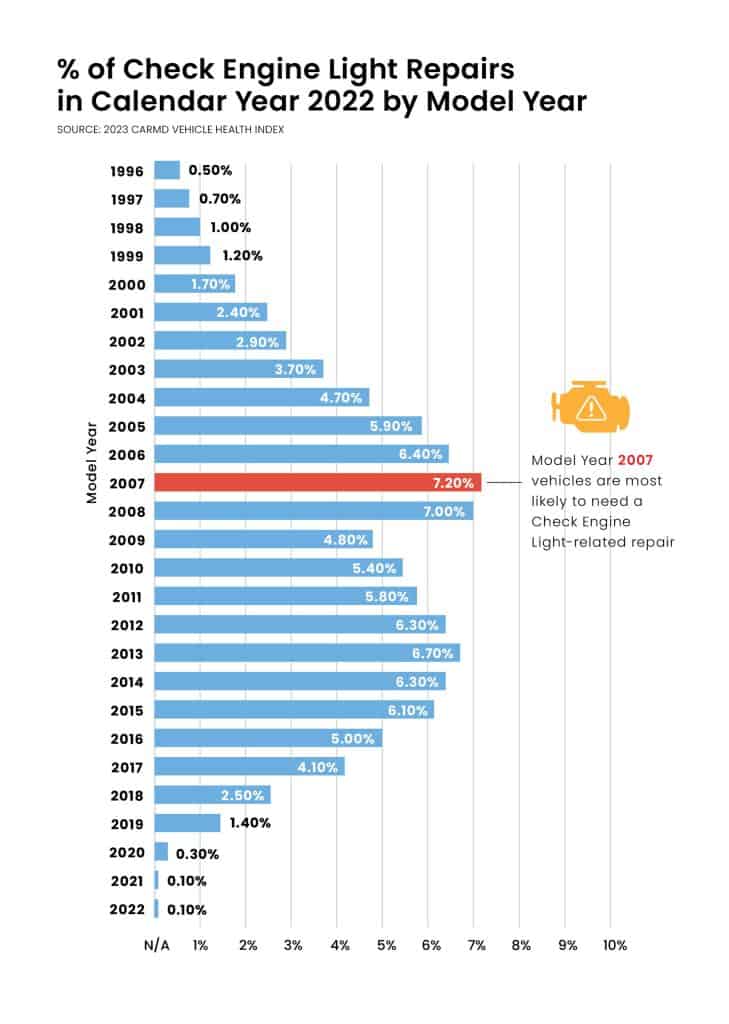
CarMD.com Corporation, a leading provider of automotive diagnostic data, today released its 2023 CarMD® Vehicle Health Index, an annual study of check engine light-related car repair trends. With new car inventory still scarce, many lessees have opted to purchase vehicles at lease end versus trading them in, driving up the average vehicle age, and impacting the type and cost of repairs. As the market changes, CarMD’s annual report can inform vehicle owners and the aftermarket about car problems and repairs to look out for.
“The check engine light comes on to warn you when your car or truck has a problem that impacts emissions and can lead to poor performance and reduced fuel economy. Ignoring the check engine light will cause your car to fail an emissions test and can result in additional repairs down the road,” said David Rich, CarMD technical vice president. “We encourage consumers and the automotive aftermarket to reference CarMD’s data to inform car care and repair decisions, especially given that inflation has driven up the cost of goods like car parts.”
The following is a breakdown of the 10 most common check engine light-related repairs in 2022 and the average cost to make that repair, including parts and labor:
- Replace catalytic converter(s), $1,313
- Replace oxygen sensor(s), $242
- Replace ignition coil(s) and spark plug(s), $392
- Replace mass air flow sensor, $303
- Tighten or replace fuel cap, (free to tighten and $25 on average to replace)
- Replace EVAP canister purge control valve, $137 (this repair is trending up from no. 8 last year)
- Replace ignition coil(s), $214 (this repair is trending down from no. 6 last year)
- Replace fuel injector(s), $424 (this repair is trending down from no. 7 last year)
- Replace thermostat, $239
- Reprogram powertrain control module, $109 (new to the list this year)
Other findings detailed in this year’s CarMD Vehicle Health Index:
- Car Repair Costs Up Amid Aging Vehicle Population. In 2022 car repair costs were up 2.8% overall, totaling $403 on average. Labor costs were actually down half a percent, which CarMD partially attributes to more DIYers doing their own repairs and competition among auto repair shops. But in a continuing upward trajectory, parts costs were up 4.7%. Factors that likely played a role in this increase include continued supply chain issues, inflation and an increase in pricier car parts failing as consumers hold on to vehicles longer than ever before.
- Vehicle Age Impacts Check Engine Light Problems. CarMD found that model year 2007 and 2008 vehicles were most likely to need a check engine light-related repair in the past year, with new (still under warranty) 2021 and 2022 cars and trucks least likely to have an issue.
- Future watch. While CarMD tracks the top 10 repairs, our statisticians monitor deep datasets for developing trends. Of note is the increase in hybrid and EV battery-related fixes. Although electric vehicles are zero-emissions vehicles (ZEV) and are not required to comply with OBD2 standards, hybrids and plug-in hybrids are equipped with internal combustion engines (ICE). Because these powertrains produce emissions, they are equipped with OBD2 diagnostics. In 2022 “replace hybrid or EV high voltage battery” ranked no. 170. In 2021 it was no. 348. And in 2020 EV batteries weren’t even on the list of common repairs, while hybrid batteries ranked no. 428.
The full 2023 Index statistically analyzes more than 17 million failures and recommended repairs for vehicles in the U.S., over the past calendar year. The data comes directly from each vehicle’s OBD2 system, reported by millions of vehicle owners and the professionals who service them. The failure and fix data are validated by CarMD’s network of Automotive Service Excellence (ASE)-certified technicians.
CarMD also offers a free CarMD Garage service to search by year, make, model and mileage to see predicted repairs and other helpful maintenance insight for your car.